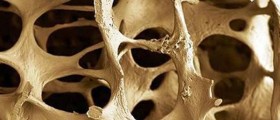
Vitamin D - cholecalciferol is a vitamin that dissolves in fat. One can consume it by the food, but also the body produces it by itself after sun exposure. Liver and kidneys convert vitamin D into its active form.
The main biological vitamin D function is to maintain normal calcium and phosphorus level in the blood. Vitamin D helps in absorption of calcium which is necessary for strong bones.
Bone Diseases
Lack of vitamin D may manifest in Hypocalcaemia, Hypophosphatemia - general demineralisation of bones, bone pain, spontaneous fractures and weakness of muscles. It is caused by inadequate absorption of calcium and phosphate which can lead to disease called rachitis. It is a metabolic bone disease in which the bones become soft and prone to distortion, while teeth become defective. Rachitis is the most common in children so they need vitamin D the most. In adults it occurs rarely.Chronic vitamin D deficiency in adults can lead to painful bone disease called osteomalacia. Also, lack of vitamin D may cause development of osteoporosis.
Cardiovascular Diseases and Stroke
Vitamin D deficiency may increase the risk of heart attack and stroke in middle aged people, according to a recent study.Dr. Thomas J. Wang and his colleagues have been monitored the health of 1.739 patients between 1996 and 2001. At the beginning of the study none of the patients had heart attack, stroke or cardiovascular problem. 29% of the respondents suffered from lower concentrations of vitamin D in the blood. Over the next 5 years, 50% of the population with reduced content of vitamin D in the blood experienced infarction, stroke or had a serious cardiovascular problem.
After processing the data about the age of respondents and other important factors that contribute to cardiovascular disease, it was found that, among other causes, vitamin D deficiency doubles the risk of cardiovascular disease, heart attack and stroke.
Chronic Pain
Scientists are convinced that the low level of “sun” vitamin sun - vitamin D can cause chronic pain in women. London experts found that lack of vitamin D has no such effect on men, which indicates that the hormones are involved in this process.Breast Cancer
Lack of vitamin D is a common finding in women suffering from breast cancer which points to a bad prognosis, disease progression, occurrence of relapse and an increased risk of death.Research in Toronto has found that women with vitamin D deficiency, compared to women with normal vitamin D level measured at the time of breast cancer diagnosis, have 94% more chances to disease progression and 73% greater likelihood of fatal outcome in the upcoming 10 years.
Multiple Sclerosis
Also, scientists have proved a link between vitamin D deficiency and risk of developing multiple sclerosis in people who have a genetic predisposition for this disease. Scientists from Canada and Great Britain have found that if level of vitamin D is low during pregnancy, the child has a good chance to develop this disease later in life. It was found that vitamin D activates proteins that are attached to the gene (DRB1-1501) which is responsible for the development of multiple sclerosis. If there is no enough vitamin D in the body, the gene cannot function properly.
















Your thoughts on this
Loading...